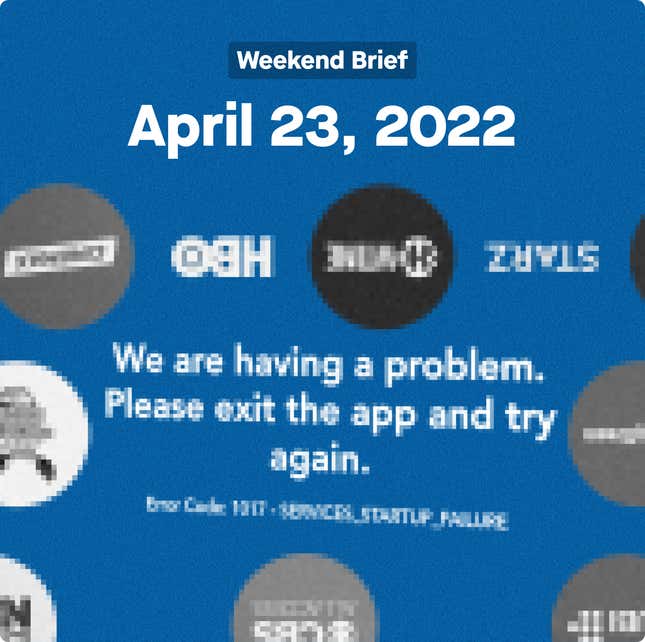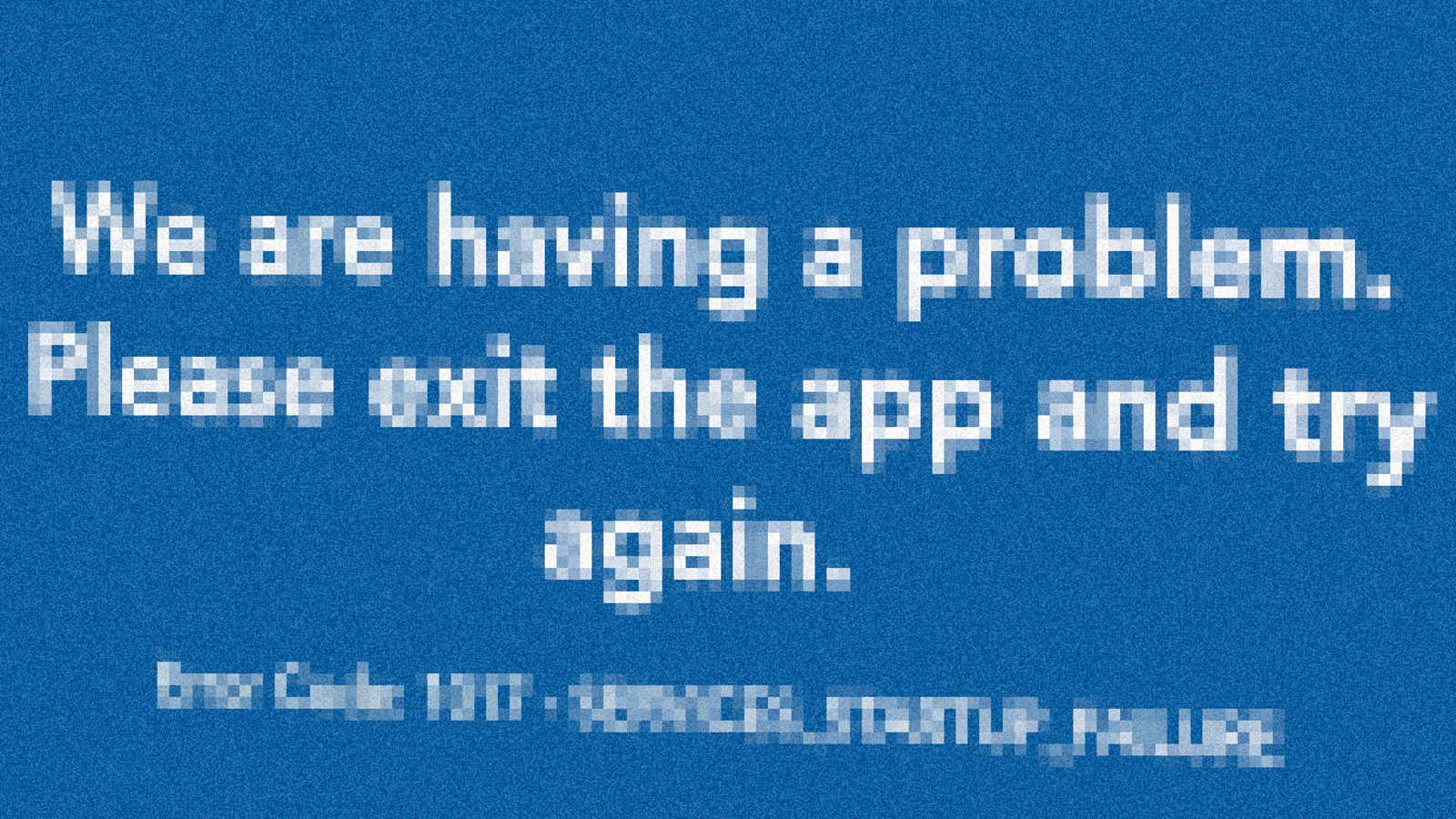
Pssst, we dropped our paywall! Quartz is on a mission to make the global economy more equitable and inclusive, a goal best realized with journalism that’s accessible to everyone. Thanks to your support as a Quartz member—which comes with our exclusive Weekend Brief and Forecast emails—we can make that happen. Log in and use this link to gift a membership, and/or to renew at 50% off.
Hi Quartz members,
Netflix lost subscribers for the first time in a decade last quarter, and expects to lose more this quarter. Gone are the days when CEO Reed Hastings could claim his main competition was sleep—now Netflix’s main competition is a long list of direct competitors, all vying for the same customers, who are in turn facing subscription fatigue.
Every company that defines a new business model goes through two phases. First it fights to grow the market, then it fights to defend it. In its first two decades, Netflix taught customers a completely different way of watching TV and movies: more binging, more browsing, and no ads, all at a monthly price well below cable. It grew alongside a global expansion in internet access, and in people willing to “cut the cord” with cable.
But imitation is both the sincerest form of flattery and the sign of a healthy market. Netflix showed the world how valuable the digital subscriptions business can be, and the world piled in after it. Today the streaming giant sees competition in Amazon, Apple, Disney, Hulu, and HBO, and in other subscription businesses it helped usher in, such as Spotify, the New York Times, and Peloton. Even platforms like DoorDash are pivoting toward the steadiness of subscriber revenue. Or, at least the historical steadiness.
As household subscriptions start to add up, that calculus may change. Just over a third of US adults canceled a subscription in the past six months, partly in response to high inflation. Made easier with personal finance apps that track monthly payments, subscription cutbacks will become an increasingly common bit of financial housekeeping.
In this world of subscription fatigue, the race is on to become the one consumers won’t dare cut. When that meant having the best video library and streaming app, Netflix was positioned to win. Now it means bundling different subscriptions together, as Amazon Prime does with video and delivery, and Apple does with TV, music, fitness, and cloud storage. (If one of those two were to buy Peloton, they’d pull even further ahead in the super-bundle sweepstakes.) Netflix, meanwhile, has signaled an openness to advertising and its intention to crack down on password-sharing, both of which could further subscribers’ willingness to cancel.
The backstory
In its first-quarter letter to shareholders (pdf), Netflix broke out four reasons it’s losing subs:
- Competition. “Over the last three years, as traditional entertainment companies realized streaming is the future, many new streaming services have also launched,” the company wrote, in what could win an Oscar for Biggest Understatement.
- Broadband adoption. “[I]t’s increasingly clear that the pace of growth into our underlying addressable market (broadband homes) is partly dependent on factors we don’t directly control, like the uptake of connected TVs (since the majority of our viewing is on TVs), the adoption of on-demand entertainment, and data costs.”
- Password-sharing. “We estimate that Netflix is being shared with over 100 million additional households. Account sharing as a percentage of our paying membership hasn’t changed much over the years,” Netflix noted, but it is making official subscriber growth harder.
- The big picture. Although Russia isn’t one of Netflix’s leading markets, the company cited “geopolitical events such as Russia’s invasion of Ukraine, and some continued disruption from covid” as factors in its slowing growth. Netflix exited Russia last month.
TLDR:
“Covid clouded the picture by significantly increasing our growth in 2020, leading us to believe that most of our slowing growth in 2021 was due to the covid pull forward.”
What to watch for next
- Advertising on Netflix. In a major reversal, Hastings says the company is now open to an ad-supported tier. “I’ve been against the complexity of advertising and a big fan of the simplicity of subscription,” he told investors. “But…allowing consumers who would like to have a lower price and are advertising-tolerant to get what they want makes a lot of sense.”
- Market share shifts. Currently, Netflix maintains about a 25% share of the US streaming TV marketplace. Analytics firm GlobalData predicts Netflix’s share will shrink to 16% by 2026, about where Hulu and Disney+ stand today (13% each).
- A streaming shakeout. Once upon a time, Quibi was the most high-profile flop in the world of streaming content. But this week Warner Bros. Discovery announced plans to shutter two-week-old CNN+, a $300 million initiative that failed to attract more than 10,000 concurrent viewers.
- Bundles for everyone. For a few years, analysts have been predicting the Great Rebundling, or the idea that consumers will soon use a single aggregator app to access all their favorite streaming services. “Skinny bundles” like Sling TV, Hulu + Live TV, and YouTube TV already piece together a limited smattering of the old cable bundle, which customers can access through a smart TV app. And Disney has started bundling its multifarious streaming services—Hulu (in which Disney owns a controlling stake), Disney+, and ESPN+ are “The Disney Bundle.”
One 🖥️ thing
The US government sued Microsoft in the late 1990s for bundling its Windows operating system with its Internet Explorer web browser. While bundling is not usually illegal, a federal judge ruled that Microsoft violated the Sherman Antitrust Act. Microsoft appealed the ruling, and reached a settlement in 2001. The government, which originally sought to break up Microsoft, instead forced it to share its application program interface (API) with third parties.
While bundles are often consumer-friendly, the US Federal Trade Commission says it is wary of them when a monopolist uses “forced buying” or “tie-ins” to make gains in markets where it isn’t already dominant to shut out rivals.
Learn more with the Quartz Obsession email on bundles.
Quartz questions to spark conversation
📈 Does the fear of inflation cause inflation?
💲 Do guaranteed income programs work?
🤔 Why does Elon Musk want Tesla to mine lithium?
🌍 What are Y Combinator’s most valuable African startups?
⏬ Why are the world’s coastal cities sinking?
🐭 How did Disney get its own special district in Florida?
💖 How do you make new friends as an adult?
👀 Does multitasking during meetings make you a jerk?
5 great stories from elsewhere
😷 Legacy of a gold mine. A reporter for The Walrus investigates her grandfather’s role as a superintendent at Canada’s Giant Mine, which for decades spewed arsenic dust into the air. “It’s not like arsenic was some new synthetic chemical that hadn’t been tested,” notes one expert. “Everybody knew arsenic was dangerous.”
⛵ Finding Endurance. To locate the remarkably well preserved ship made famous by Ernest Shackleton’s 1914 expedition, an underwater robot dangling from an icebreaker dove 10,000 feet and blasted the sea floor with sonar. Nico Vincent, the mission’s subsea project manager, tells Wired, “it was probably one of the most complicated shipwrecks to discover.”
📋 Who runs the world? If you could start from scratch, what kind of governance system would you set up for a country or a company? Cold Takes posits that traditional structures are too limiting for companies seeking a balance between control and flexibility, and explores innovative solutions like proportional decision-making, quadratic voting, and sortition.
🍲 Losing our lunch. The old food hall in Manhattan’s Penn Station may not have been a culinary destination, but it did provide affordable dining options for 650,000 daily commuters. Cut to the shiny new Moynihan Train Hall, which offers significantly pricier fare (plus a late-night DJ). Eater wonders: Does this flavor of capitalism provide any benefit for consumers?
💅 Julia on Julia. In a Q&A with New York Times Magazine, actress Julia Roberts muses on power, regret, family, and her 20-year romantic-comedy drought. “What I’ve learned is that you always want to do what you’re not doing,” she says. “Whenever I’m in a comedy, I think I just want to be at a table with a cup of tea sobbing over something. Then you’re doing that, and you think, Oh to be wearing a pretty dress and laughing.”
Thanks for reading! And don’t hesitate to reach out with comments, questions, or topics you want to know more about.
Best wishes for an unbundled weekend,
—Walter Frick, executive editor
—Adario Strange, media and entertainment reporter
With contributions from Scott Nover.
